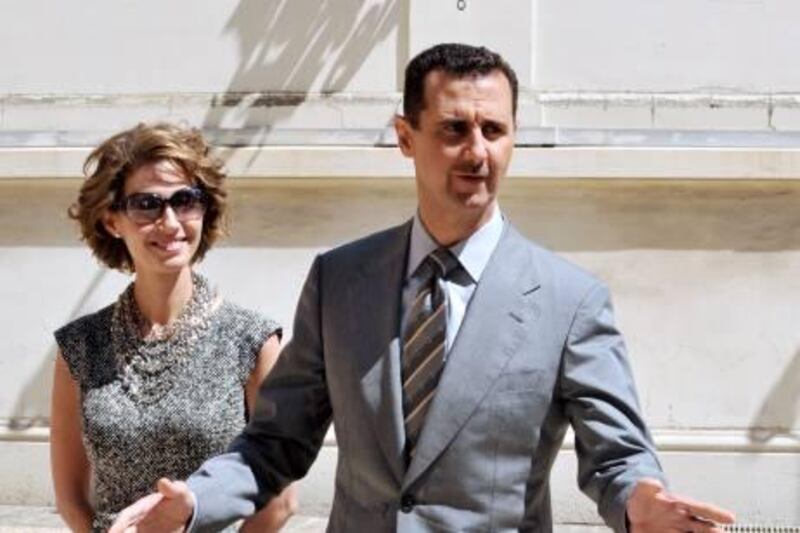Of all the countries undergoing political upheaval in the Arab uprisings, none poses such a mystery as Syria. With little free media access to the country, it is difficult to ascertain the true state of the Syrian rebellion. Television channels that wish the Assad regime ill, such as Qatar's Al Jazeera or Saudi Arabia's Al Arabiya, continue to report protest after protest, but we are also presented (usually by different sources) evidence of popular support for the regime too. Experts say Homs, Hama and Deir az-Zor, among other provincial towns, side with the rebels, but Damascus and Aleppo, Syria's political and economic capitals, remain loyal. Legions of YouTube users offer evidence of the regime's crimes and their own upheaval, and a steady stream of deaths at the hands of the security forces - lately between 20 and 30 a day - continues. Yet the balance never seems to quite tip. What will get it there?
The Syrian regime has proved, over the last decade, a remarkable survivor. Time and again, Bashar Al Assad has pulled back from the brink, taking his father's style of brinkmanship to new levels. It is easy to forget that in 2004 it was commonplace in Washington to discuss regime change in Damascus. Syria was not quite part of George W Bush's "axis of evil", but it had junior membership. The widespread belief that Syria was behind the assassination of the former Lebanese prime minister Rafiq Hariri in 2005, its subsequent hurried withdrawal from Lebanon, and mounting allegations that it was turning into a staging station for the jihadist international's operations in Iraq, made the country seem vulnerable.
Bashar Al Assad, the weak-chinned second son of the "Lion of Damascus" who had never been meant to rule (his brother Basel, who died in a car crash near Damascus's notoriously foggy international airport, had been the heir apparent) used the uncertainty over his own power to weather these storms. In many respects, Bashar played a magnificent game of international diplomacy, making subtle leverage of shifts in US, EU, Russian, Iranian, Turkish and Saudi foreign policy priorities to ensure his regime's continued survival. By the beginning of 2011, Bashar was having it both ways: Washington was kept at bay through a process of engagement based on the idea that Syria could be moved away from Iran, while Syria increased its public overtures of friendship towards Tehran and consolidated its status as a member of the Resistance Front that carried on the struggle against Israel and imperialism.
In the Lion's Den is part-memoir, part-analysis of this turbulent decade of US-Syrian relations. But it also explains why the Assad regime, even as it seems to emerge triumphantly unscathed on the international scene, lost a domestic battle it had too long taken for granted. Andrew Tabler, its author, is a journalist turned commentator who moved to Damascus from Cairo in early 2002 - in part because he felt frustrated with Egypt's conservative and conspiracy-prone society and more at ease with more secular Syria, even if the regime there was more oppressive. He tells the story of working for a publication (Syria Today) that, given protection from Asma Al Assad, the president's photogenic wife, hoped to make use of the appearance of a limited opening for reform at the beginning of Assad's reign. This "Damascus Spring" was short-lived - it only lasted about 18 months - and it can be argued that Tabler stayed on too long, far beyond the point when any hope of "reform" was lost.
Much of the book's appeal is that it is an honest meditation on the moral choices one faces when working closely to a regime of this kind. On the one hand, Tabler was given some privileged access to officials and the rare ability to live in and report on a very closed country and thus disseminate information about it. On the other, as an early advocate of engagement with Syria and, for a time, an optimist about the regime's ability to carry out at least limited reforms (particularly on the economic front), it could be argued that Tabler was both drinking and peddling the Assad Kool-Aid.
But his account of working on what might be argued were the regime's outer circles is darkly comic, replete with chilling anecdotes of what life is like in Syria, most of all the nerve-racking uncertainty of what might happen to you in a country whose inner workings are utterly opaque, where disorientation and manipulation by (competing) security services and political factions are routine, and one is forced to perpetually walk a psychological tightrope.
The author's past proximity to Damascus also explains why Tabler, now an analyst at the Washington Institute for Near East Policy, an influential pro-Israel think tank, is currently one of the Assad regime's harshest critics and an advocate of regime change through economic pressure and covert support of the opposition (but not, at least so far, foreign military intervention, unlike some of his colleagues.) He has the ardent faith of the convert. The part of the book that is memoir is, as a result, far more engaging than its analytical component, which, while a useful recap of bilateral feints, overtures and snubs, tends to frame Syria-US relations from a largely American point of view.
In the Lion's Den does not deal with the Syrian uprising, having been written mostly before the Arab Spring erupted. But it does offer some insight not only into Syrian diplomacy and the regime's twisted thinking, but also the broader social and economic challenges the country faces. In the epilogue, Tabler suggests that while Damascus is a hard read, the economy could be the key to its undoing.
In recent years, Syrian oil production, a major source of income for the regime, has sharply dropped as consumption of fuel and electricity rose. A mounting sanctions regime and western political pressure pushed Syria into opening its economy to Turkey, which helped it gain important political support for a while but also caused massive displacement in the domestic economy, with superior Turkish goods pushing out Syrian manufacturing and empowering traders in Aleppo at the expense of small factory owners in Homs. Corruption and flawed privatisation presented as reform empowered regime cronies such as Rami Makhouf, Assad's brother-in-law, generating widespread resentment from the business elite.
The targeted sanctions that have been imposed in recent months have focused on these weaknesses, draining Syria's state coffers by allowing imports and preventing their replenishment by making it more difficult for Syrian businesses to interact with the outside world and export oil. Some Syrian activists hope the economic crunch the regime will inevitably face when, for instance, it is no longer able to pay civil service salaries, will mark the point when the state bureaucracy will join the rebels.
One must wonder whether economics alone will do the trick, though. Even now, Assad is playing on the possibility of state collapse in Syria to ward off foreign intervention.
He is also warning that Syria's post-1973 role of regional "spoiler" - Henry Kissinger's adage that there can be no Middle East war without Egypt and no peace with Syria - will continue. Because of the brutal suppression of the uprising, he has put old allies in difficult position: where Hamas is now moving away from Damascus and Hizbollah's Hassan Nasrallah has to uncomfortably explain why he is outraged about Bahrain but not about Syria. Even Iran is getting flak from Arab commentators for its position. Syria remains the eye of the storm in the Middle East's great strategic divides, and it is hard to imagine that the regime will be willing to go without causing maximum damage.
Issandr El Amrani is an independent Cairo-based journalist. He blogs at www.arabist.net










